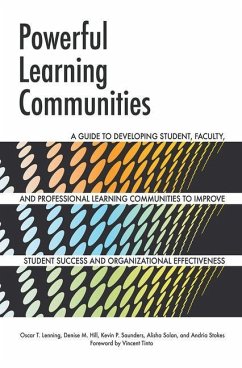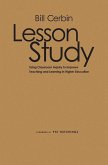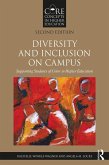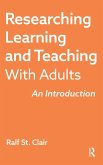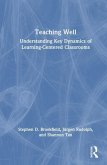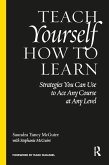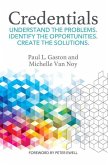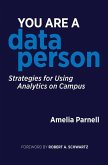This book constitutes a comprehensive guide for readers who want a broad strategic view of learning communities, enabling them to identify which type of LC best meets the learning needs of their students, and the context and mission of their institution.
Hinweis: Dieser Artikel kann nur an eine deutsche Lieferadresse ausgeliefert werden.
Hinweis: Dieser Artikel kann nur an eine deutsche Lieferadresse ausgeliefert werden.
"Drawing on a 100-institution survey as well as their own experiences, the five authors have collaborated to create this well-organized, thorough guide. Anyone in higher education seeking to advocate for, create, or expand or refine the learning community approach at their institution will find here plenty of creative ideas and supportive data. Material is organized logically beginning with conceptual underpinnings, a typology of learning communities, and design and implementation in face-to-face, virtual, or hybrid settings. Subsequent coverage includes student success, legal and ethical issues, assessment guidelines, and potential pitfalls and how to deal with them. Lenning (emeritus, with a long list of affiliations from a long career) co-authored an earlier book The Powerful Potential of Learning Communities (1999) for which this work can be considered a sequel."
Book News, Inc.
"Powerful Learning Communities combines a comprehensive review of learning community structures and implementation with a consistent focus on maximizing student learning. The examination of many types of LCs across institutions reinforces the assertion that building institutional partnerships and systemically implementing LC principles are essential elements of transformative and sustainable change. The appendices provide excellent resources for the practical application of principles and research results presented in this book."
Anne Goodsell Love, Associate Provost for Assessment, Wagner College
"Powerful Learning Communities is an important book that closes the gap between theory and practice. The unique, lively 'scenarios' included in every chapter tell the stories that make the research meaningful and relevant. The authors have organized an immense amount of material by anchoring current research findings in authentic academic situations that we can all recognize. This book will be a wonderful professional development resource for institutions looking to introduce or expand learning communities."
NancyShapiro, University System of Maryland
and author of Creating Learning Communities and Sustaining Learning Communities
"The authors delineate various strategies institutions have employed to successfully implement learning communities and the types of commitments and partnerships that institutions, faculty, and staff have to make to see them fully implemented. In these and many other ways, Lenning and his colleagues have put into one place information and insights that we would otherwise have to glean from a wide range of resources, some more difficult to locate than others. All who are interested in developing learning communities owe them a debt of gratitude."
Vincent Tinto, Syracuse University
"Oscar Lenning and his colleagues have produced a landmark scholarly and policy statement on effective learning communities. It should be read by every faculty member and administrator in postsecondary education who is concerned with maximizing the developmental potential of this powerful educational intervention for students."
Ernest T. Pascarella, Professor and Mary Louise Petersen Chair in Higher Education, The University of Iowa
Book News, Inc.
"Powerful Learning Communities combines a comprehensive review of learning community structures and implementation with a consistent focus on maximizing student learning. The examination of many types of LCs across institutions reinforces the assertion that building institutional partnerships and systemically implementing LC principles are essential elements of transformative and sustainable change. The appendices provide excellent resources for the practical application of principles and research results presented in this book."
Anne Goodsell Love, Associate Provost for Assessment, Wagner College
"Powerful Learning Communities is an important book that closes the gap between theory and practice. The unique, lively 'scenarios' included in every chapter tell the stories that make the research meaningful and relevant. The authors have organized an immense amount of material by anchoring current research findings in authentic academic situations that we can all recognize. This book will be a wonderful professional development resource for institutions looking to introduce or expand learning communities."
NancyShapiro, University System of Maryland
and author of Creating Learning Communities and Sustaining Learning Communities
"The authors delineate various strategies institutions have employed to successfully implement learning communities and the types of commitments and partnerships that institutions, faculty, and staff have to make to see them fully implemented. In these and many other ways, Lenning and his colleagues have put into one place information and insights that we would otherwise have to glean from a wide range of resources, some more difficult to locate than others. All who are interested in developing learning communities owe them a debt of gratitude."
Vincent Tinto, Syracuse University
"Oscar Lenning and his colleagues have produced a landmark scholarly and policy statement on effective learning communities. It should be read by every faculty member and administrator in postsecondary education who is concerned with maximizing the developmental potential of this powerful educational intervention for students."
Ernest T. Pascarella, Professor and Mary Louise Petersen Chair in Higher Education, The University of Iowa

